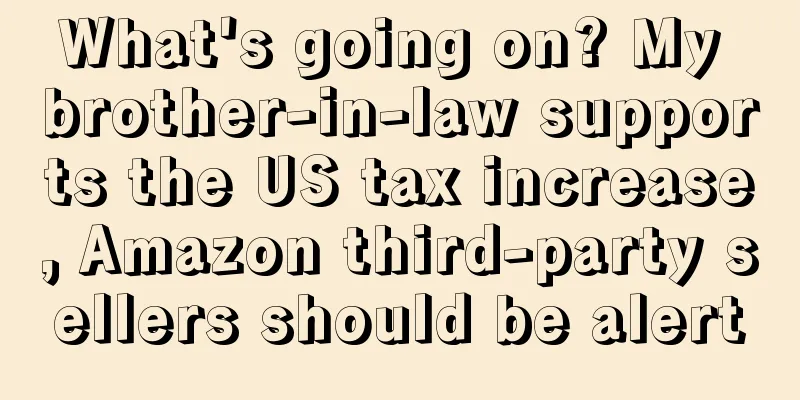What's going on? My brother-in-law supports the US tax increase, Amazon third-party sellers should be alert

|
Amazon, the largest e-commerce company in the United States, is often criticized by local governments. Especially during Trump's presidency, he would frequently criticize Amazon on Twitter over tax issues, but my brother-in-law never responded directly. After Biden came to power, his attitude changed. He issued a statement expressing support for Biden's $2 trillion infrastructure plan, most of which will be funded by taxes, which means that the United States will significantly increase corporate tax rates and tax enforcement. On Tuesday, Bezos said in a statement: " The Biden administration plans to make bold investments in American infrastructure, and we support this policy . In the past, both Democrats and Republicans have supported infrastructure construction. Now is the time to work together and move forward together. We also recognize that investment requires compromises from all parties, including specific content and how to pay for it. We also support raising corporate tax rates. We look forward to Congress working together with the government to find the right and balanced solution to maintain or enhance America's competitiveness." For a company with a market value of over $1.6 trillion, once it pays taxes or raises its corporate tax rate, it means it will have to pay huge taxes. My brother-in-law's support at this time is really confusing. It is understood that in 2018 and 2019, Amazon was exposed by the media for taking advantage of numerous tax refunds and federal support policies. Not only did it not pay any taxes, but it also received tens of millions of dollars in subsidies from the federal government. This is very ironic for a company with a market value of trillions and a net profit of tens of billions each year. However, last year, facing pressure from antitrust investigations, Amazon had to pay federal corporate taxes and keep a low profile and pay some protection fees to the government. Of course, another reason was that it made too much money in 2020, with a net profit growth rate of 84%, almost doubling that of 2019. Although Amazon paid taxes last year, a research institute analyzed that Amazon still took advantage of many tax refund and subsidy policies, and the actual tax rate paid by Amazon was only 9.4%. It saved $1.8 billion through stock option tax benefits and $639 million through various tax credits. Biden's new infrastructure plan will increase the federal tax rate from 21% to 28%. For Amazon, this will not have a big impact on its actual tax rate as long as its tax avoidance methods are not blocked. On the one hand, this approach not only pleases the Biden administration, but also scares those e-commerce companies that are not as big as Amazon. It is indeed a win-win solution! So if Amazon raises taxes once the infrastructure plan is implemented, will it have an impact on third-party sellers? This is the question that everyone is most concerned about. According to Xiaozha, the US government's tax increase is only effective for companies registered in the United States, so Chinese sellers don't have to worry too much. Currently, the US site needs to pay consumption tax, which is mainly automatically deducted by Amazon . As long as the products are sold to states that need to levy online consumption tax, Amazon will automatically calculate and deduct the corresponding amount based on the tax rate of each state. Currently, 43 states in the U.S. require Amazon to pay sales tax on their behalf, and only 7 states are temporarily exempt from paying sales tax. In total, nearly 90% of states have to collect sales tax on their behalf, and this cost has almost completely covered the operations of sellers on the U.S. site. But it is impossible to have no impact at all. As taxes increase, it means that tax enforcement on third-party sellers will be strengthened. This not only means that the remaining regions will join the ranks of imposing consumption tax on e-commerce as soon as possible, but also means that more taxes will expand the scope of taxation to include e-commerce sellers. If sellers are required to actively register at that time, their layout on the US site will require more tax considerations. |
<<: Big changes in European VAT! Sellers' profits shrink by 20%! Just now, Amazon announced...
Recommend
The urgent imposition of power restriction "tightening curse" hints at abnormal internal circulation! Will sellers welcome the spring of price increase?
Recently, Meng Wanzhou returned to the embrace of ...
To win in 2025, these overseas hot product trends cannot be missed!
According to eMarketer's forecast, global e-co...
What is China (Hangzhou) Cross-border E-commerce Comprehensive Pilot Zone? Evaluation of China (Hangzhou) Cross-border E-commerce Comprehensive Pilot Zone
China (Hangzhou) Cross-border E-commerce Comprehen...
American consumers adjust their spending! Seize this booming holiday in the second quarter
According to the latest data from NPD Group, more ...
The US Postal Service plans to impose a peak season surcharge! Small sellers will be most affected!
<span data-shimo-docs="[[20,"获悉,日前美国邮政(USP...
What is White Friday? White Friday Review
White Friday is the biggest e-commerce promotion f...
What is Betabrand? Betabrand Review
Betabrand was founded in August 2010. It is a Sili...
Home Depot invests more than $170 million to strengthen online retail in Mexico
It is learned that on April 9, according to foreig...
Amazon gives away free homepage with no negative reviews? New rules for insurance purchases!
▶ Video account follow-up navigation It is learned...
What is Quantify Ninja? Quantify Ninja Review
Quantify Ninja is a comprehensive operational tool...
How to determine the specific cause of copyright infringement
In the actual operation process, the risk of infr...
2021 US e-commerce market report is released! Amazon's market share exceeds 40%
It is learned that according to the latest report ...
Amazon plans to disclose internal data! Is the era of self-operation over?
Europe's antitrust investigation into Amazon h...
Amazon is testing a new advertising model! Some sellers are already using it
At the beginning of this year, Amazon made a wave...









